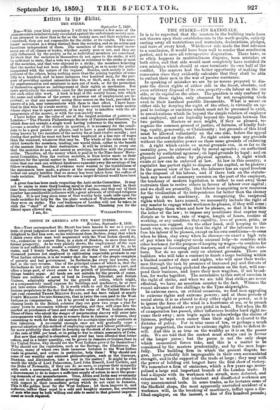Itt1rr5 lii 1i ettitni.
TILE STEINE.
SePtcmber 7, 1869. Sm—With your kind permission I will try to correct a few more of the aisstatements so industriously circulated against the unfortunate society men. I am prepared to show that as far as the society men and their societies are concerned, they are not responsible for the strike or its results. The nine- hours' movement is a thing distinct from the societies, and in its action and functions independent of them. The members of the nine-hours' move- ment are of all classes of trades, whether society men or not, and they are only influenced by the society as far as individual members are concerned. To show that the societies in themselves do not agree to the strike, it will be sufficient to state, that a vote was taken in reference to the strike at most of the societies, and that vote objected to a strike; the members believing that the matter had not been sufficiently agitated, so as to make the public acquainted with the nature of the request. Besides, each society is inde- pendent of the others, being nothing more than the joining together of some fifty to a hundred, and in some instances two hundred men, for the pur- pose of providing against calamities like fire, or theft, and, in some cases, for superannuation and assistance to men out of work, or for the protection of themselves against an infringement of their rights as mechanics. But more particularly the societies exist for the purpose of enabling men to as- sist each other into work. A book is kept at the society house, into which the name and address of the person or persons out of employment are in- scribed ; so that any member seeing those names on the book, provided he knows of a job, may communicate with them to that effect. I have bene- fited in this wise by a trade society. But I have never found a trade society whose object was to upset masters, or in any way to interfere with the ar- rangements of the master, or with the non-society men. I have before me the rules of one of the largest societies of painters in London—" The Phcenix Philanthropic Society of Painters and Glaziers,"— which does not contain a aingle word having reference to the masters. To become a member of the society in question, it is necessary for the candi- date to be a good painter or glazier, and to have a good character, besides being known by two members of the society for at least twelve months ; and during that period he must not have been employed at a less rate of wages than the standard, whatever that may be. The whole of the rules are very strict towards the members, tending, one would think, rather to the benefit of the masters than to their destruction. It will be evident to every one that the societies do nut, and cannot as societies, interfere with the present strike. Therefore, all the money which is paid in to the Nine-hours' Move- ment Committee, from the various societies, is from levies made on their members for the special matter in hand. To conceive otherwise is to con- ceive that one man can without hindrance squander away the earnings of his fellow-workmen. Besides, if evidence were wanted to the truthfulness of the statements here made, a glance at the money distributed to the men locked out amply testifies that no money has been taken from the coffers of trade societies. If such had been the case a larger dividend would have been made.
A great fuss has been made respecting the Anti-strike Committee. It may
not be amiss to state thatjl men, in that movement have in their
time been industrious agitators in kinds of strikes, and that one of their number has considerable influence with a great advocate of civil and religious liberty. It is not long since some of that worthy body made calls upon the trade societies for help for the tin-plate workers of Wolverhampton when they were on strike. The real tradesmen of London will not be taken in with the "chaff" of the Anti-strike Committee. Thanking you for the liberal space allowed me,


























 Previous page
Previous page